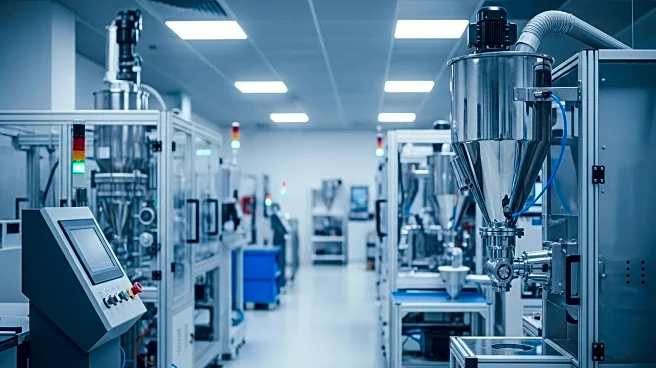What is the story about?
What's Happening?
Polyplastics Group, a prominent player in the engineering thermoplastics industry, has unveiled its DURAST Powder technology. This innovation transforms high-performance resins into fine powders, facilitating diverse manufacturing processes such as prototyping, 3D printing, and mass production. The technology successfully micronizes high-strength, high-molecular-weight resins, which were previously challenging to powder, into various shapes like spherical or fibrous forms. This advancement addresses issues faced by conventional grinding methods, such as particle agglomeration and reduced flowability. DURAST Powder achieves uniform powderization with an average particle size of 1-100 micrometers, enhancing powder flowability and mixing dispersibility. This contributes to process stability and improved quality, particularly for resins like liquid crystal polymer (LCP) and polyphenylene sulfide (PPS).
Why It's Important?
The introduction of DURAST Powder technology by Polyplastics is significant for the manufacturing industry, particularly in the realm of additive manufacturing and high-precision parts production. By enabling the powderization of high-molecular-weight resins, the technology opens new possibilities for creating complex shapes and high-quality components. This advancement is expected to enhance the production of carbon fiber-reinforced thermoplastics and serve as an organic filler or reinforcing material. The improved powder flowability and mixing dispersibility can lead to more stable processes and higher quality outputs, potentially reducing costs and increasing efficiency in manufacturing operations.
What's Next?
Polyplastics' DURAST Powder technology is poised to impact various sectors by facilitating the production of complex and high-precision parts. The technology's application in additive manufacturing and powder sintering could lead to advancements in industries reliant on high-performance materials. As the technology gains traction, it may prompt other companies to explore similar innovations, potentially leading to broader adoption and further advancements in manufacturing processes. Stakeholders in the engineering plastics industry will likely monitor the technology's performance and its integration into existing manufacturing systems.
Beyond the Headlines
The development of DURAST Powder technology by Polyplastics may have deeper implications for the engineering plastics industry. By overcoming challenges associated with conventional grinding methods, the technology could set new standards for resin powderization, influencing future research and development in the field. Additionally, the ability to produce high-quality powders with specific particle sizes may lead to innovations in product design and material science, potentially impacting sectors such as automotive, aerospace, and consumer electronics.















